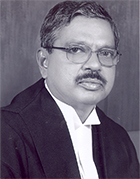
Meet Justice H.L. Dattu and his Notable Judicial decisions
Justice Handyala Lakshminarayanaswamy Dattu served as the 42nd Chief Justice of India from September 28, 2014, to December 2, 2015. Born in 1950 in Karnataka, he began his legal career in Bangalore, specializing in civil, criminal, constitutional, and taxation law. He served as a judge and then Chief Justice in various High Courts before his elevation to the Supreme Court in 2008. After retirement, he was appointed Chairperson of the National Human Rights Commission.
Judicial Career and Philosophy
Justice Dattu was known for his hard work, integrity, and pragmatic approach to law. He authored 117 Supreme Court judgments, focusing primarily on criminal, civil, service, and constitutional matters. He emphasized the protection of individual rights, due process, and the principle that liberty is a fundamental value in the justice system.
Landmark Judgments
1. Devinder Pal Singh Bhullar v. State (2014)
Justice Dattu was on the bench that commuted the death penalty of terror convict Devinder Pal Singh Bhullar to life imprisonment. The Court held that inordinate delay in deciding mercy petitions and the convict’s mental illness were valid grounds for commutation. This expanded Indian jurisprudence on the death penalty, emphasizing humane treatment and the right to life.
2. 2G Spectrum Case (Bail Rulings, 2011–2012)
Justice Dattu, along with Justice G.S. Singhvi, delivered a significant ruling on bail for corporate accused in the 2G spectrum scam. The bench reiterated that “bail is the rule and jail an exception,” affirming the presumption of innocence until proven guilty and setting a precedent for granting bail in white-collar crime cases.
3. Acquittal in Terror Cases
Justice Dattu headed the bench that acquitted 11 persons charged under terror laws, cautioning the Gujarat police against branding innocent individuals as terrorists based solely on their minority status. He stressed that no innocent person should be wrongfully incarcerated, reinforcing the importance of evidence-based justice and protection of minority rights.
4. Gimik Piotr v. State of Tamil Nadu
In this preventive detention case, Justice Dattu underscored that such detention is a potential weapon for human rights abuses and should only be used with “clear and convincing evidence” that a person would commit a crime. He reinforced constitutional safeguards against arbitrary detention.
Legacy
Justice H.L. Dattu is remembered for his principled stands on human rights, due process, and judicial restraint. His judgments on the death penalty, bail, and preventive detention have shaped Indian criminal jurisprudence. As NHRC Chairperson, he continued to champion human rights and access to justice, leaving a significant mark on India’s legal landscape.












comments